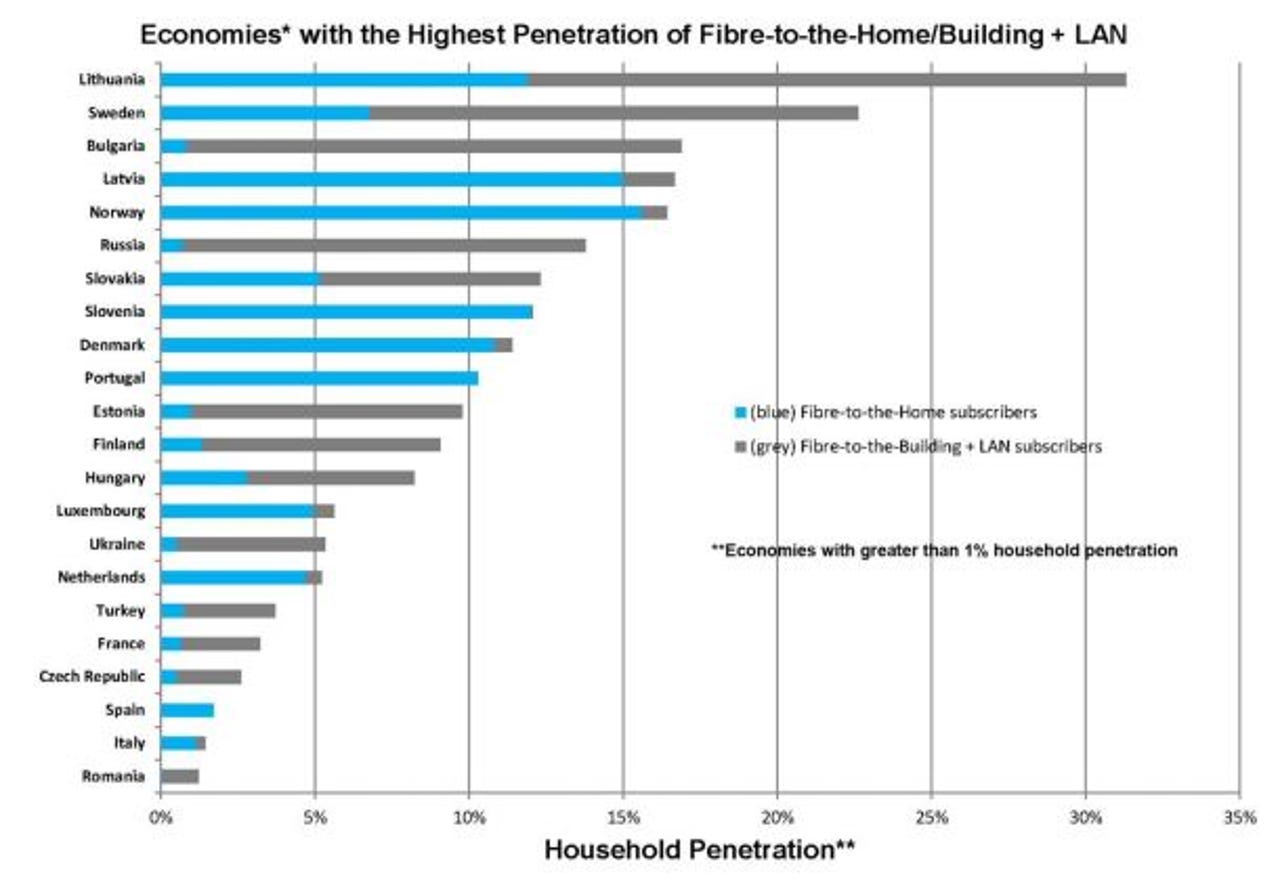Why HS2 not FTTH? The UK is spending £42.6bn on rails instead of optical fibres

The British government is spending £42.6 billion on a new west-coast railway line rather than providing the whole nation with superfast broadband. It seems the UK can afford HS2 (High Speed 2) but not FTTH (Fibre-to-the-home) or FTTP (Fibre-to-the-premises). In a world that depends on the rapid transfer of bits, rather than atoms, this doesn't appear to be a sensible decision.
Former Conservative cabinet minister Cheryl Gillan reckons HS2 is "30 years too late" and points out that: "Technology and the whole of the UK is moving in a different direction."
Worse, the new line from London to Birmingham (Phase 1) won't come into operation until 2026, so who knows how far the online world will have developed by then? How much more ground we will have lost through having a second-rate broadband infrastructure?
If you don't recognise the £42.6 billion number, that's because it has recently increased from £33 billion. The extra £10 billion covers changes to the (much protested) route, including new tunnels.
Given that vast government spending projects typically cost far more than originally planned, one can only guess at the eventual bill. It's likely to be around £50 billion, including trains, and transport minister Patrick McLoughlin told MPs that HS2 would deliver "around £50bn worth of economic benefits once it is up and running."
This is, unfortunately, nonsense, according to the UK's National Audit Office. The government's "economic benefits" include £12.6 billion for business time savings, but, as the NAO pointed out, this "uses a simplifying assumption that time spent travelling is unproductive".
Most business people already do useful work while on trains. That being the case, it would probably be better -- and infinitely cheaper -- to provide free high-speed Wi-Fi on the existing London to Birmingham route, and preferably other mainline routes as well.
Either way, it's easy to think of better ways to spend £50 billion when the financial benefits of HS2 may be zero or perhaps negative.
In particular, we have known for 25 years that the UK would be much more productive if the government invested in FTTH, which has more or less infinite capacity, and should last for at least 50 years.
As I wrote in The Guardian four years ago: "Ian Mackintosh pointed this out -- and analysed the economic implications -- in his book, Sunrise Europe, published in 1986. Yes, 'we can't afford it,' though it turns out we could afford to dig up half the country to exploit short-term North Sea gas, to fight foreign wars, and to bail out a morally and intellectually bankrupt financial system." Just add HS2 to this growing list.
Instead of doing the job once, and doing it properly (FTTH), we've been through a succession of modems of different speeds, several versions of DSL, and a current system -- BT Infinity -- that runs fibre to the street cabinet (FTTC) before using existing copper wiring to the home or office. All this incremental improvement has come at vast expense.
Of course, the British government does recognise the value of high-speed broadband. However, contrast the expenditure of £42.6 billion on HS2 with its idea for a "Next Generation Fund" -- a plan to raise more than £1 billion over eight years by taxing fixed telephone lines at 50p per month. (And fixed telephone lines are already too expensive.)
The government has also pumped £530 million into a rural broadband project, as part of Broadband Delivery UK. Jeremy Hunt, who was Culture Secretary at the time (2011), said that 90% of premises in the UK should have internet speeds above 24Mbps by May 2015, while the rest would have a minimum of 2Mbps. This month, according to the BBC, the National Audit Office reported that the project was 22 months behind schedule, and that BT, the supplier, would get £1.2 billion in public funds.
Hunt rashly claimed that we'd have "the best broadband in Europe by 2015". Presumably, he'd forgotten about Sweden and the Netherlands, though these are still behind really advanced countries such as South Korea, Japan and Hong Kong.
It's not clear where UK broadband actually ranks, but in January, Akamai's State of the Internet report placed it 12th in Europe and 17th in the world in terms of average connection speed. The roll-out of BT Infinity should have improved that, but other countries are progressing as well.
When it comes to FTTH, the UK's situation is dire. According to FTTH Council Europe, the UK still has one of the lowest penetration rates in Europe, with less than 0.1 percent of British homes connected via fibre. The rate has to reach 1 percent for a country to even make the table (below). In this case, the UK trails a long way behind countries such as Lithuania, Latvia, Slovenia, Estonia and Ukraine. Even Turkey is ahead of the UK.
It wouldn't take a huge amount of money to provide "superfast broadband" -- defined as 30Mbps or more -- across the UK, because much of it could be done with a VDSL service over copper, such as BT Infinity. A study by Point Topic put the cost at €7.5bn. This is less than the £10 billion recently added to the price of HS2.
Rolling out FTTH would obviously cost more, and as always, "we can't afford it". But put it to a popular vote, and I'd be amazed if the British people wouldn't prefer to spend £50 billion (or less) on FTTH instead of HS2.
